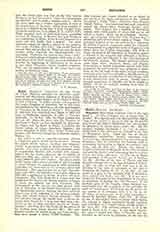

Benjamin (Heb. BNYMYN, binjdmin,” son of the right hand”). (I) The youngest son of Jacob born of Rachel. His original name was Ben-oni (Heb. BN-AVNY, “son of my sorrow”), given to him by his mother just before she died in child-birth, but was changed to Benjamin by Jacob (Gen., xxxv, 18). The Samaritan reading, Benjamim, i.e. “son of days”, would refer to the advanced age of Jacob at the time of Benjamin’s birth. Upon the loss of Joseph, Benjamin’s full-brother, Jacob‘s affections were bestowed upon Benjamin, and it was only with great reluctance that he permitted his beloved child to accompany his brethren to Egypt to purchase corn (Gen., xlii, 36; xliii, 15). Joseph, too, showed a marked preference of Benjamin to his other brethren and puts the latter’s mind concerning him to a rather severe test (Gen., xliv—xlvi). (2) The son of Balan and grandson of Benjamin, Jacob‘s son (I Paralip., vii, 10). (3) One of the sons of Herem who had married a foreign wife in the days of Esdras (I Esdras, x, 32). (4) One of those who took part in the rebuilding of the walls of Jerusalem at the time of Nehemias (II Esdras, iii, 23; cf. xii, 33). (5) The name of a gate in the northern wall of Jerusalem (Jer., xxxvii, 12; Zach., xiv, 10). It is not mentioned by Nehemias in his enumeration of the gates of Jerusalem (II Esdras, iii). (6) The name of the northern gate of the Temple, where Jeremias was imprisoned (Jer., xx, 2; xxxviii, 7, 14), probably the same as “watch-gate” (II Esdras, xii, 38) and as the one spoken of in Jeremias (viii, 3, 5, 16; ix, 2). (7) Name of eastern gate of the ideal Jerusalem as drawn by Ezechiel (Ezech., xlviii, 32). (8) Name of one of the twelve tribes of Israel which during the sojourn in Egypt numbered 35,400 warriors, and according to a second census 45,600 (Num., i, 36; xxvi, 41). The territory assigned to it is defined in Josue, xviii, 11 sqq. It was about twenty-five miles in length and twelve in breadth, and was bounded on the north by Ephraim, on the east by the Jordan, on the south by Juda, and on the west by Dan. The nature of the territory was conducive to breed a race of hardy warriors such as the Benjamites who are depicted by Jacob as “a ravenous wolf, in the morning [he] shall eat the prey, and in the evening shall divide the spoil” (Gen., xlix, 27). During the period of the Judges the tribe was well nigh exterminated on account of a crime committed within its territory (Jud., xix-xxi). It was from this tribe that Saul, the first king of the monarchy, was chosen (I Sam., ix, 1, 2, 19; x, 1, 20 sqq.). After the death of Saul the tribe of Benjamin remained loyal to his son, Isboseth (II Sam., ii, 9 sqq.), until David became king of all Israel (II Sam., v, 1-5). At the time of the revolt from Rehoboam the tribes of Benjamin, Juda, and Simeon remained true and formed the Kingdom of Juda (III Kings, xii, 21), which also constituted the nucleus of the restored nation. St. Paul glories in belonging to the tribe of Benjamin (Philipp., iii, 5).
F. X. E. ALBERT

